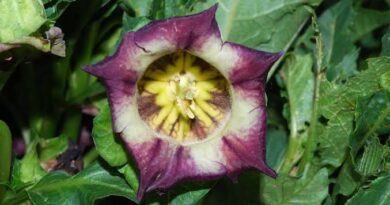6 Medicinal Health Benefits Of Turbinicarpus (Cactus)
Turbinicarpus is a genus of small, globular or cylindrical cacti that belongs to the family Cactaceae. Native to Mexico and the southwestern United States, these cacti are adapted to arid environments and are known for their compact size, distinctive spination, and often colorful flowers.
The genus Turbinicarpus includes a variety of species, each with its own unique characteristics. Generally, Turbinicarpus cacti are small and compact, with bodies ranging from globular to cylindrical.
The plants often have tubercles, which are small, raised structures on the surface of the stem that give the cacti a textured appearance. The tubercles may be arranged in spirals or columns, depending on the species.
One notable feature of Turbinicarpus cacti is their spination. These cacti typically have radial spines that radiate outward from the areoles, which are small, cushion-like structures from which the spines emerge. The central spines, if present, are usually stouter than the radials.
The spination not only serves as a defense mechanism against herbivores but also contributes to the cacti’s unique aesthetic appeal.
Turbinicarpus cacti are known to produce vibrant and often fragrant flowers. The flowers emerge from the apex of the cactus and can be various colors, including shades of white, pink, yellow, or red.
The flowers are typically funnel-shaped and may have contrasting centers. The blooming period varies among species and can occur during different seasons.
Cultivation of Turbinicarpus cacti requires attention to their natural habitat conditions. These cacti thrive in well-draining soil and are adapted to arid regions with plenty of sunlight.
Like many cacti, they are sensitive to overwatering, and their soil should be allowed to dry out between watering intervals. Turbinicarpus cacti are often grown by cactus enthusiasts and collectors, and various species are valued for their unique characteristics.
As with many cacti, Turbinicarpus cacti are resilient and can tolerate harsh environmental conditions. However, it’s important to note that these plants are often protected by international conservation agreements due to habitat loss and illegal collection.
Therefore, if you’re interested in growing Turbinicarpus cacti, it’s advisable to obtain them from reputable sources that adhere to ethical and legal standards.
In conclusion, Turbinicarpus cacti are fascinating and visually appealing plants that have adapted to arid environments. Their compact size, unique spination, and colorful flowers make them popular among cactus enthusiasts.
As with any plant, responsible cultivation practices and adherence to conservation guidelines are crucial to ensure the continued well-being of these intriguing cacti.
The Botanical Description of Turbinicarpus
1. Morphological Characteristics: Turbinicarpus, a genus of small cacti, displays a distinctive morphology. These slow-growing plants typically assume a solitary, globose to cylindrical shape, often with ribs adorned by unique tubercles. These tubercles may bear spines or glochids, contributing to the overall appearance of the cactus.
2. Flowers and Fruits: Turbinicarpus is known for its exquisite flowers that add a burst of color to the arid landscapes they inhabit. The flowers, while small, exhibit a range of colors from white and yellow to pink and red. Additionally, Turbinicarpus produces unique fruits, varying in shape and size depending on the specific species.
3. Adaptations to Arid Environments: Evolving to thrive in arid conditions, Turbinicarpus has developed specialized features. Thickened stems and a well-developed root system enable efficient water storage, a crucial adaptation for survival in harsh desert environments. These morphological characteristics contribute to the cactus’s ability to withstand drought and extreme temperatures.
The Geographic Distribution of Turbinicarpus
1. Native Habitats: Turbinicarpus primarily inhabits the arid regions of North America, stretching from Mexico into parts of the United States. These cacti thrive in rocky and sandy soils, showcasing adaptability to challenging environmental conditions. Specific habitats can vary among different Turbinicarpus species.
2. Altitudinal Range: Turbinicarpus’s geographic distribution spans a range of altitudes, from lower elevations to higher mountainous regions. This adaptability to different altitudes underscores the resilience of these cacti in diverse landscapes. Some species prefer lower elevations in desert valleys, while others thrive in higher elevations in mountainous terrain.
3. Endemism and Conservation Status: Some Turbinicarpus species exhibit endemism, being exclusively found in specific geographic areas. Concerns about the conservation status of certain species arise due to factors like habitat loss and illegal collection. Ongoing conservation efforts aim to protect these unique cacti and their natural habitats.
The Chemical Composition of Turbinicarpus
1. Alkaloid Content: Turbinicarpus cacti contain various alkaloids, chemical compounds with diverse physiological effects. These alkaloids contribute to the cacti’s bitter taste and likely serve as a defense mechanism against herbivores. Researchers are actively studying the types and concentrations of alkaloids present in Turbinicarpus species.
2. Water-Soluble Compounds: Alongside alkaloids, Turbinicarpus may contain water-soluble compounds integral to the plant’s physiology. These compounds could be involved in water storage, nutrient transport, or other essential biological processes. Understanding the chemical composition is crucial for unraveling Turbinicarpus’s adaptation to arid environments.
3. Phytochemical Diversity: Turbinicarpus’s chemical composition varies among species, contributing to their distinct characteristics. Researchers explore this phytochemical diversity for potential applications in medicine, horticulture, or other fields. Uncovering the unique chemical profiles of different Turbinicarpus species enhances our understanding of their ecological roles and potential uses.
Read Also: Farming and Care Guide for Chinese Mitten Crab (Eriocheir sinensis)
The Medicinal Health Benefits Of Turbinicarpus (Cactus)

1. Anti-Inflammatory Properties: Turbinicarpus, commonly known as cactus, possesses significant anti-inflammatory properties. The plant contains compounds that can help reduce inflammation, providing relief for conditions such as arthritis and other inflammatory disorders.
2. Digestive Health: The consumption of Turbinicarpus has been linked to improved digestive health. The plant’s fibers and mucilage content contribute to a healthy digestive system by promoting regular bowel movements and preventing constipation.
3. Blood Sugar Regulation: Turbinicarpus may play a role in regulating blood sugar levels. Some studies suggest that certain compounds in the cactus can improve insulin sensitivity, making it beneficial for individuals managing diabetes.
4. Hydration and Skin Health: The high water content of Turbinicarpus makes it a valuable source of hydration. Adequate hydration supports overall health, including skin health. The plant’s extracts are also used in skincare products to moisturize and nourish the skin.
5. Rich in Antioxidants: Turbinicarpus is rich in antioxidants that help combat oxidative stress in the body. These antioxidants play a crucial role in neutralizing free radicals, which can contribute to various chronic diseases and aging.
6. Weight Management: Some compounds found in Turbinicarpus may aid in weight management. The plant’s ability to promote a feeling of fullness and regulate blood sugar levels can be beneficial for those looking to manage their weight.
The Methods of Usage to Achieve the Provided Health Benefits Of Turbinicarpus (Cactus)
1. Culinary Use: Incorporating Turbinicarpus into your diet can be achieved through various culinary methods. The cactus pads, known as nopales, are commonly used in Mexican cuisine in salads, soups, or as a side dish.
2. Herbal Teas and Extracts: The medicinal benefits of Turbinicarpus can be harnessed through the preparation of herbal teas or extracts. Boiling cactus pads or using commercially available extracts allows for easy consumption and absorption of beneficial compounds.
3. Dietary Supplements: Turbinicarpus supplements, available in various forms like capsules or powders, provide a convenient way to access the plant’s health benefits. These supplements are often standardized to ensure consistent dosages of active compounds.
4. Skincare Products: Extracts from Turbinicarpus are used in skincare products such as creams and lotions. These products aim to leverage the hydrating and antioxidant properties of the cactus for skin nourishment and anti-aging effects.
The Side Effects Of Using Turbinicarpus Medicinal Plant
1. Allergic Reactions: In some individuals, the consumption or topical application of Turbinicarpus may lead to allergic reactions. Symptoms can include skin irritation, redness, or gastrointestinal discomfort. It’s essential to perform a patch test before using products containing cactus extracts.
2. Gastrointestinal Issues: Excessive consumption of Turbinicarpus may lead to gastrointestinal issues such as diarrhea or stomach cramps. Moderation is key, and consulting with a healthcare professional is advisable, especially for individuals with existing digestive conditions.
3. Interaction with Medications: Turbinicarpus may interact with certain medications, impacting their effectiveness. Individuals taking medications, especially those related to diabetes or blood pressure, should consult their healthcare provider before incorporating cactus supplements into their routine.
4. Not Suitable for Everyone: While Turbinicarpus offers health benefits, it may not be suitable for everyone. Pregnant or breastfeeding individuals, as well as those with specific health conditions, should seek guidance from a healthcare professional before using Turbinicarpus for medicinal purposes.
Read Also: 17 Medicinal Health Benefits Of Sanguisorba officinalis (Great Burnet)
The Scientific Research and Studies of Turbinicarpus

1. Anti-Inflammatory Properties: Numerous scientific studies have delved into the anti-inflammatory properties of Turbinicarpus, commonly known as cactus. Research suggests that compounds present in the plant may inhibit inflammatory processes, holding promise for conditions such as arthritis.
2. Antioxidant Content: Scientific investigations have explored the antioxidant content of Turbinicarpus. These studies reveal the presence of potent antioxidants that play a crucial role in neutralizing free radicals, contributing to overall health and potentially preventing various diseases.
3. Blood Sugar Regulation: Scientific research on Turbinicarpus has focused on its potential role in blood sugar regulation. Findings suggest that certain compounds in the cactus may influence insulin sensitivity, making it a subject of interest for diabetes management.
4. Phytochemical Composition: Studies have aimed to identify and understand the diverse phytochemical composition of Turbinicarpus. Researchers seek to unravel the specific compounds responsible for the plant’s medicinal properties, providing insights into its potential applications.
The Safety Precautions and Recommendations In Using Turbinicarpus Medicinal Plant
1. Allergic Reactions: Individuals using Turbinicarpus for medicinal purposes should be aware of the potential for allergic reactions. Skin irritation or gastrointestinal discomfort may occur, and a patch test is advisable, especially for topical applications.
2. Moderation in Consumption: While Turbinicarpus offers health benefits, moderation is essential. Excessive consumption may lead to gastrointestinal issues, such as diarrhea or stomach cramps. Consulting with a healthcare professional can help determine an appropriate dosage.
3. Medication Interactions: Turbinicarpus may interact with certain medications, affecting their efficacy. Individuals taking medications, particularly those related to diabetes or blood pressure, should seek guidance from a healthcare provider before incorporating cactus supplements.
4. Not Suitable for Everyone: Pregnant or breastfeeding individuals and those with specific health conditions should exercise caution. Seeking advice from a healthcare professional before using Turbinicarpus for medicinal purposes is crucial to ensure its safety and suitability.
FAQs About Turbinicarpus Medicinal Plant
1. Can Turbinicarpus be Consumed Daily?
While Turbinicarpus offers health benefits, daily consumption should be approached with moderation. Excessive intake may lead to digestive issues, and it’s advisable to consult with a healthcare professional to determine an appropriate dosage.
2. Are There Any Known Allergic Reactions?
Yes, some individuals may experience allergic reactions to Turbinicarpus. Skin irritation or gastrointestinal discomfort can occur, and a patch test is recommended, especially for those using cactus extracts topically.
3. Can Turbinicarpus Interact with Medications?
Turbinicarpus may interact with certain medications, affecting their effectiveness. Individuals taking medications, especially for diabetes or blood pressure, should consult their healthcare provider before incorporating cactus supplements into their routine.
4. Is Turbinicarpus Safe for Pregnant Women?
Pregnant or breastfeeding individuals should exercise caution when using Turbinicarpus for medicinal purposes. Consulting with a healthcare professional is essential to assess safety and suitability during pregnancy or lactation.
Read Also: What You Need To Know About Ragdolls









